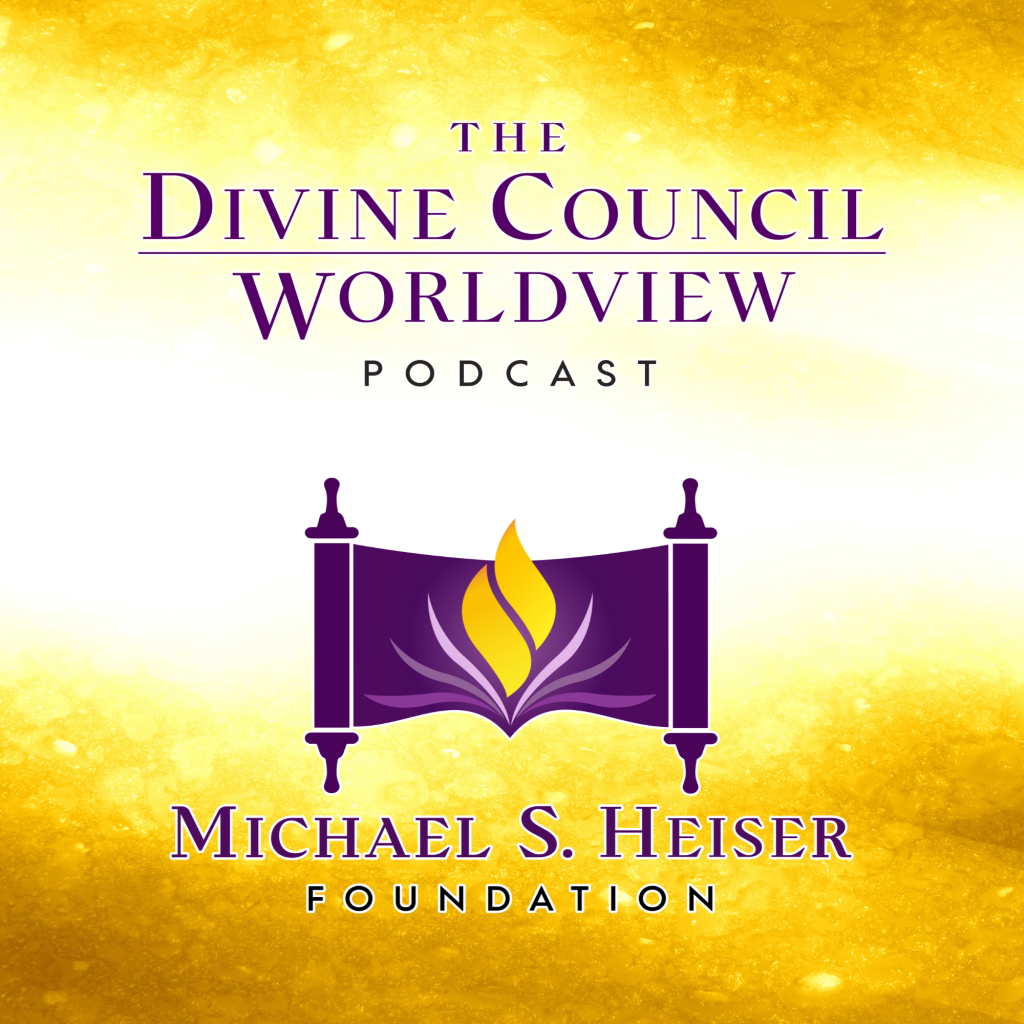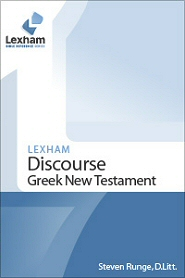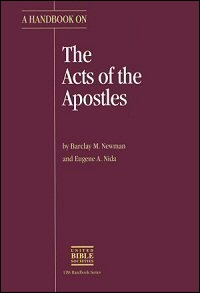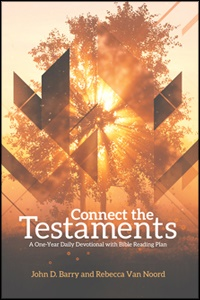Christians sometimes get confused with the concept of judging. Biblically we are commanded to judge (John 7:24 says, “Stop judging by mere appearances, and make it right judgement”). Then at the same time we are biblically told that we are not to …
Deuteronomy 22:1 Daily Dose of Hebrew
Matthew 7:29 Daily Dose of Greek
Naked Bible 416: Paul’s Use of the Old Testament Series: The Son of Man
Great discussion, originally aired a few years ago 🙏
Acts 5:21-24 (LDGNT) Short Study
Our understanding of the Greek New Testament is based almost entirely on English translations, but how would our understanding of the Greek text change if we read it for what it is: as Greek? With The Lexham Discourse Greek New Testament, we can now get behind the words of the New Testament writers and discover the particular linguistic tasks that inform translation and interpretation.
The Greek Text
22 οἱ δὲ παραγενόμενοι ὑπηρέται οὐχ εὗρον αὐτοὺς ἐν τῇ φυλακῇ ἀναστρέψαντες δὲ ἀπήγγειλαν
23 λέγοντες ὅτι Τὸ δεσμωτήριον εὕρομενκεκλεισμένον ἐν πάσῃ ἀσφαλείᾳ καὶ τοὺς φύλακας ἑστῶτας ἐπὶ τῶν θυρῶν ἀνοίξαντες δὲ ἔσω οὐδένα εὕρομεν ”
24 ὡς δὲ ἤκουσαν τοὺς λόγους τούτους ὅ τε στρατηγὸς τοῦ ἱεροῦ καὶ οἱ ἀρχιερεῖς διηπόρουν περὶ αὐτῶν τί ἂν γένοιτο τοῦτο
25 παραγενόμενος δέ τις ἀπήγγειλεν αὐτοῖς ὅτι Ἰδοὺ οἱ ἄνδρες οὓς ἔθεσθε ἐν τῇ φυλακῇ εἰσὶν ἐν τῷ ἱερῷ ἑστῶτες καὶ διδάσκοντες τὸν λαόν
26 τότε ἀπελθὼν ὁ στρατηγὸς σὺν τοῖς ὑπηρέταις ἦγεν αὐτοὺς οὐ μετὰ βίας
Runge, S. E. (2008–2014). The Lexham Discourse Greek New Testament (Ac 5:22–23). Lexham Press.
Translation
The English Standard Version™ is founded on the conviction that the words of the Bible are the very words of God. And because the words themselves—not just the thoughts or ideas—are inspired by God, each word must be translated with the greatest precision and accuracy.
22 But when the officers came, they did not find them in the prison, so they returned and reported,
23 “We found the prison securely locked and the guards standing at the doors, but when we opened them we found no one inside.”
24 Now when the captain of the temple and the chief priests heard these words, they were greatly perplexed about them, wondering what this would come to.
25 And someone came and told them, “Look! The men whom you put in prison are standing in the temple and teaching the people.”
26 Then the captain with the officers went and brought them, but not by force, for they were afraid of being stoned by the people.
The Holy Bible: English Standard Version (Ac 5:22–26). (2016). Crossway Bibles.
Commentary
This set of detailed commentaries provides valuable exegetical, historical, cultural, and linguistic information on the original text. Over the years this series has been instrumental in shedding light on the Scriptures so that translators all over the world could complete the important task of putting God’s Word into the many languages spoken in the world today.
The officials (see 13:5) are either officers of the Jewish Council or Levites of the temple guard under the officer in charge of the temple guards (see v. 24). In some languages the term officials is equivalent to “policemen.” In other instances the closest equivalent is “soldiers.”
To the Council has been added to the verb they returned in order to indicate to what place they returned.
The verb reported may be rendered as “said to the men in the Council.”
When we arrived at the jail is implicit in the Greek text and the TEV has made this information explicit. Most translators prefer to render without a transitional (NEB “we found the jail securely locked”).
The phrase found it locked up tight may require some slight modification since in some languages one does not “lock a jail,” but rather one “locks the doors of the jail”; therefore, “found the doors securely locked.”
The clause all the guards on watch at the gates is equivalent in many languages to “all the soldiers carefully guarding the doors.”
There is a potential problem in the phrase did not find anyone inside. This could be interpreted to mean that the angel of the Lord led out not only the apostles but all of the criminals in the jail. Some translators have therefore preferred to render this as “did not find either of the apostles inside.” Note that in verse 24 the concern is only for the apostles who had apparently escaped.
The officer in charge of the temple guards is the same term used in 4:1 They wondered what had happened to the apostles is one possible meaning of the difficult Greek expression in this verse. Goodspeed (“they were very much at a loss as to what would come of it”) and JB (“they wondered what this could mean”) are two other possible translations of this somewhat puzzling expression.
The location indicated by in must be made more specific in some languages, for example, “into the Council” or “where the leaders were gathered together.”
The particle translated listen may have the force of “at this very moment” (see JB). It is the same particle that the TEV translates right now in 5:9 and suddenly in 1:10.
The reference to standing is again not so much a designation of posture as one of location.
In some languages the relationship between standing and teaching is expressed by two closely combined clauses: “they are in the temple; they are teaching the people.”
The officer is the same word used in verse 24, the officer in charge of the temple guards.
Many languages are quite specific in the use of terms such as brought … back. In this context a rendering may be “caused them to return with them” or “commanded them to return with them.” The text clearly states that no physical force was used.
In order to indicate clearly that they did not use force, one may say in some languages “they did not grab them” or “they did not tie them up.” In other languages a common expression is “they did not beat them.”
It is important that in the final clause the goal of the stoning is the officer and the soldiers, not the apostles.
Newman, B. M., & Nida, E. A. (1972). A handbook on the Acts of the Apostles (pp. 125–126). United Bible Societies.
Daily Devotional from Connect the Testaments by John Barry & Rebecca Van Noord
This 365-day devotional walks you through the Bible in a year, following a custom reading plan that delves into the stories of the Bible from five unique perspectives.
April 30: They’re Futile; This Isn’t
Joshua 22:10–24:33; 2 Corinthians 13:11–14; Psalm 60:1–12
If you knew it was time to die, to say goodbye for good, what would you say? How would your final hoorah sound?
In an episode of Northern Exposure, Dr. Joel Fleischman is convinced that he is dying. Joel, who is usually conservative, begins risking everything: he drives a motorcycle way too fast without a helmet, gets a ticket that he rips up, and eventually crashes the bike—all while feeling no remorse. He then returns to his office to learn that he is actually fine; his doctor’s initial inclination was incorrect. Almost immediately, he becomes angry that he didn’t know his fate earlier. In his recklessness, he could have prematurely ended his life.
The risks you take when you think your life is over are quite different from those you’re willing to take when you think you’re fine. The things you say, the person you are, would be very different if you knew tomorrow were your last day.
Joshua, who led Israelites into the promised land, knew his end was coming. As an old man, he commanded the Israelites: “But hold fast to Yahweh your God … Yahweh has driven out before you great and strong nations; and as for you, nobody has withstood you to this day. One of your men put to flight a thousand, for Yahweh your God is fighting for you, just as he promised you” (Josh 23:8–10).
Paul made a similar remark: “For we rejoice whenever we are weak, but you are strong, and we pray for this: your maturity” (2 Cor 13:9). Paul realized that maturity in Christ will always put us in the right place in the end. He concluded his letter to the Corinthians by expanding upon this message: “Finally, brothers [and sisters], rejoice, be restored, be encouraged, be in agreement, be at peace, and the God of love and peace will be with you” (2 Cor 13:11).
What would you say if you were Joel, Joshua, or Paul? What would you do? As Christians, the response should be the same no matter how long we have to live; Christ could come tomorrow. Does that thought give you joy or great fear?
Whenever we experience pain, grief, or encounter enemies, the oppositions of life seem to distract us from our great purpose in Christ. They mask the brevity of our time on earth. Perhaps this is why the psalmist puts it best: “Give us help against the adversary, for the help of humankind is futile. Through God we will do valiantly, and it is he who will tread down our enemies” (Psa 60:11–12).
What hope are you currently placing in the futility of humankind?
What actions can you take to refocus your hope on Christ?
John D. Barry
Barry, J. D., & Kruyswijk, R. (2012). Connect the Testaments: A One-Year Daily Devotional with Bible Reading Plan. Lexham Press.
The Divine Council Worldview Podcast EP010: The Genealogy of Genesis 5

Dr. Ronn Johnson
Welcome to the Divine Council Worldview Podcast, where hosts Ronn Johnson and Mike Chu honor the legacy of their late friend and colleague Dr. Michael S. Heiser (author of the best-selling book The Unseen Realm). Our interest is the Bible…
Show Notes
In this episode, Ronn and Mike review the place of Genesis 5 in the early story of the Bible. They suspect that this list of fathers and sons was formatted to suit a literary purpose as well as to recognize that a line of Yahweh-worshippers could be identified between Adam and Noah. Enoch is noted as among these righteous men, mysteriously disappearing off the earth after faithfully walking with his God. At the conclusion of this episode they introduce the pivotal narrative which took place during the days of Noah: a certain number of bene elohim (a Hebrew phrase signifying god-class or divine beings) became involved with the human race resulting in the birth of nephilim, “famous men” known to the original readers. This is truly one of the most unusual stories in all the Bible—yet it is also a significant story in the development of a Divine Council worldview.
The Mindset of a Child of God
The Dictionary of Bible Themes contains over 2,000 thematic articles with an explanation of the theme, key Bible references, and cross-references to related themes. Comparable to the venerable Nave’s Topical Bible in scope, the Dictionary of Bible Themes stands apart in its unique, nine-level classification of themes that brings related biblical and theological concepts together.
Scripture identifies a range of positive attitudes towards God, which believers are encouraged to adopt.
Trust
Pr 3:5 See also Ps 20:7; 25:1-2; 40:4; 56:11; Jn 14:1; Ro 15:13
Faith
Mt 8:10 pp Lk 7:9 See also Mt 9:2 pp Mk 2:5 pp Lk 5:20; Heb 11:1-39
Hope
Job 13:15 See also Ps 25:5; Isa 40:31; Mic 7:7; Ro 4:18
Love
Dt 6:5 See also Dt 30:6; Ps 18:1; 116:1; Jn 21:15-17
Holiness
Heb 12:14; 1Pe 1:15-16 See also Dt 7:6; 14:1-2; Ro 12:1-2; 1Co 5:7-8; Col 3:2
Awesome respect
Ecc 12:13 See also Dt 10:12-13; Pr 1:7; 9:10; Jer 5:22; Ac 9:31; Rev 14:7
Repentance
2Co 7:10 See also Job 42:6; Eze 14:6; Ac 2:38; 17:30
Humility
Isa 66:2 See also Ezr 8:21; Jas 4:10; 1Pe 5:6
Self-denial
Mt 16:24 pp Mk 8:34 pp Lk 9:23
Submission
Jas 4:7 See also Job 22:21; Ro 8:7; 10:3
Thankfulness
1Th 5:18 See also 1Ch 16:34; Ps 35:18; 100:4; Mt 14:19; Eph 5:20; Php 4:6; Col 2:7
Praise
Heb 13:15 See also Ezr 3:11; Ps 148:1-5; 150:1-6; Isa 42:10; 61:3; Ac 2:46-47; Jas 5:13
Prayerfulness
Jas 5:13 See also Mt 14:23; 26:41; Ro 8:26; 1Th 5:17
Reverence
Ps 5:7 See also Ne 5:15; Mal 2:5; 4:2; Eph 5:21; Heb 12:28; 1Pe 3:1-2
Watchfulness
Col 4:2 See also Lk 12:37-38; 1Th 5:6-8; 1Pe 5:8
See also
5959 submission
6732 repentance
8020 faith
8266 holiness
8297 love for God
8333 reverence
8352 thankfulness
8475 self-denial
8490 watchfulness
8618 prayerfulness
8664 praise
9612 hope, in God
Manser, M. H. (2009). Dictionary of Bible Themes: The Accessible and Comprehensive Tool for Topical Studies. Martin Manser.
Verse of the day Psalm 100:4 (NET)

Faithlife Study Bible (FSB) is your guide to the ancient world of the Old and New Testaments, with study notes and articles that draw from a wide range of academic research. FSB helps you learn how to think about interpretation methods and issues so that you can gain a deeper understanding of the text.
100:4 his gates The psalmist portrays joyous singing as worshipers enter the temple.
his courts Contributes to the image of God as king. See note on 92:13.
his name God’s name refers to His nature and character rather than a particular label. See note on 91:14.
Barry, J. D., Mangum, D., Brown, D. R., Heiser, M. S., Custis, M., Ritzema, E., Whitehead, M. M., Grigoni, M. R., & Bomar, D. (2012, 2016). Faithlife Study Bible (Ps 100:4–5). Lexham Press.





